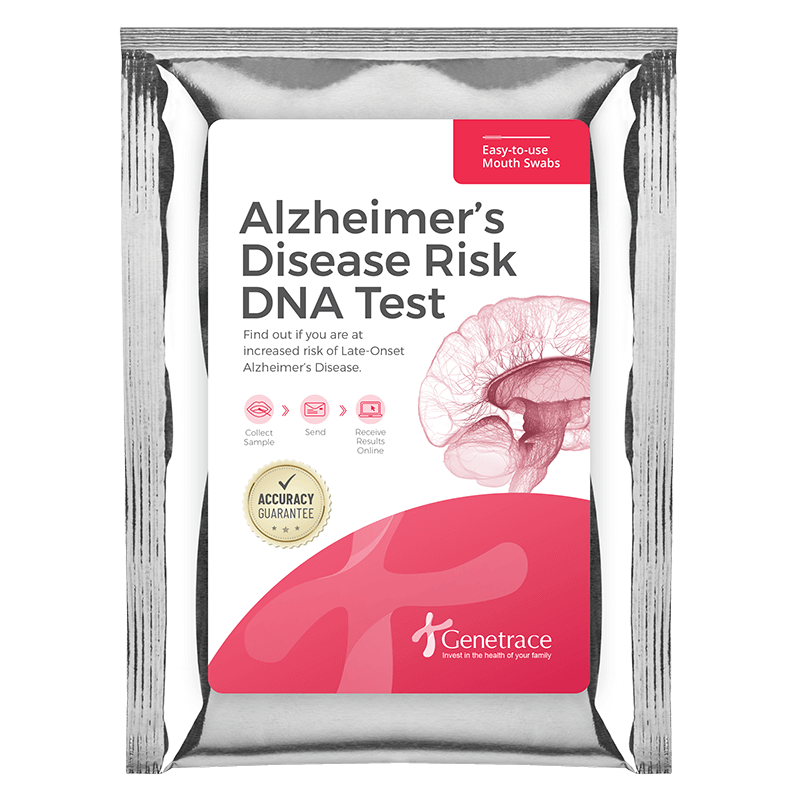About the Test
About the Alzheimer’s Disease APOE DNA Test

Find out if you are at risk - get tested
| Test Type | Testing Time | Fee |
|---|---|---|
 DNA Alzheimer's Disease Test
DNA Alzheimer's Disease Test
| 4 to 6 weeks |
$195
Click Here to Order Kit |
All orders received before 3pm PST / 6pm EST are shipped out the same business day. All orders received after 3pm PST / 6pm EST or on weekends or holidays are shipped out the following business day. 24/7 online status check and account management available for all tests.
About the Alzheimer’s Disease APOE DNA Test
The Alzheimer’s disease DNA test will determine whether you carry the APOE e4 allele which is associated with an increased lifetime risk of developing late-onset Alzheimer’s disease. It is important to note that individuals who test positive for two copies of APOE e4 are at 10x to 15x increased risk of developing Alzheimer’s Disease, but not all individuals who carry the APOE e4 allele will eventually go on to develop Alzheimer’s disease later in life.
Alleles of APOE
There are three forms or alleles of APOE: APOE e2, APOE e3 and APOE e4. Each person inherits one APOE allele from each parent, so there are six possible combinations of the APOE alleles (e2/e2, e2/e3, e2/e4, e3/e3, e3/e4, e4/e4). The Alzheimer’s disease APOE genotype DNA test identifies the alleles for each person tested and indicates whether or not there is an increased or decreased lifetime risk of developing late-onset Alzheimer’s.
The APOE e2 allele is relatively rare (present in 8.4% of the population) and appears to have a slight protective affect against Alzheimer’s disease.
APOE e3 is the most common allele (77.9%) and neither decreases or increases the risk of Alzheimer’s disease.
The APOE e4 allele increases the risk of Alzheimer’s disease and is present in 13.7% of the population. Individuals with one copy of the APOE e4 have three times the risk of developing late-onset Alzheimer’s, while those with two copies of APOE e4 have 10X to 15X increased lifetime risk of developing Alzheimer’s Disease. However, it is important to note that which having the APOE e4 genotype greatly increases the risk of developing Alzheimer’s Disease, there will be some individuals who have one or more APOE e4 alleles that never get Alzheimer’s Disease and other people who develop Alzheimer’s, despite not having any APOE e4 genes.
Alzheimer’s Disease APOE DNA Test Specifications
Age Limit None. This test can be taken at any age.
DNA Collection Method Buccal swabs. The DNA test kit contains buccal swabs and instructions for collecting a buccal swab sample quickly and painlessly from inside the mouth.
Specimen Requirements Four buccal swabs, rubbed inside the mouth against the cheek for 15 seconds.
Testing Time 5 to 7 business days
Alleles Tested
- APOE e2
- APOE e3
- APOE e4
Testing Methodology Laboratory specimens are analyzed using sequence-based typing to detect the presence of three APOE alleles. Analytical specificity and sensitivity for detection of these alleles are >99%. Other alleles not listed are not detected.
Sample Handling The Alzheimer’s disease DNA test kits do not have an expiry date and can be used at any time. Once the DNA sample is collected, it must be returned to the laboratory for testing within three months of collection. No refrigeration is required. Store at room temperature.
Limitations It is important to remember that the presence of the APOE e4 allele does not mean that an individual will definitely develop Alzheimer’s disease. The APOE e4 allele does increase the the lifetime risk of developing Alzheimer’s Disease but there are many individuals that have this allele and never develop Alzheimer’s. There are also people that do not have the APOE e4 allele who develop the disease. An increased risk for Alzheimer’s can also be caused by a variety of genetic and non-genetic factors that are not detected by this assay.
